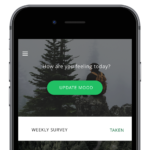Technology, such as electronic health records, and use of tablets can facilitate the communication and recording and sharing of data, between the various partners involved in delivering health and social care.
Blended therapy for men who self-harm #DigiMHweek

Olivia Kirtley looks at a qualitative study of a blended therapy using problem solving therapy with a customised smartphone app in men who present to hospital with intentional self-harm.
[read the full story...]








